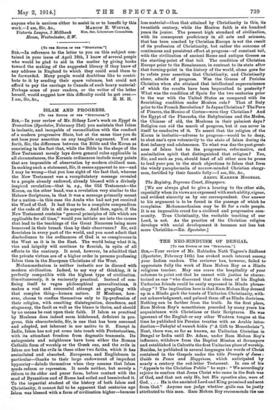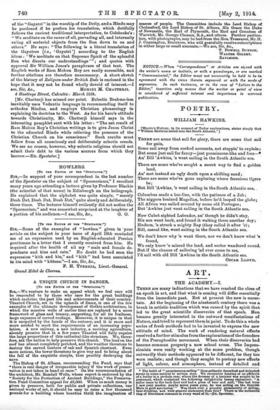THE NEO-HINDUISM OF BENGAL
[To TIM EDITOR or me "Brecraror.1 Sin,—Your review of Mr. Rabindra Nath Tagore's Stidhanit (Spectator, February 14th) has evoked much interest among your Indian readers. The reviewer has, however, failed to appreciate fully the work of Ram Mohan Roy as a Hindu religious teacher. May one crave the hospitality of your columns to point out that he cannot with justice be charac- terized as one "who discerned that the ideas of his English Unitarian friends could be easily expressed in Hindu phrase. ology " ? The implication here is that Ram Mohun Roy dressed up in a Hindu garb the tenets of Unitarian Christianity, with- out acknowledgment, and palmed them off as Hindu doctrines. Nothing can be farther from the truth. In the first place, Ram Mohun Roy's monotheism preceded by many years his acquaintance with Christians or their Scriptures. He was ignorant of the English or any other Western tongue at the time he published his Persian treatise with an Arabic intro- duction—Tuhafat ul nuwah hidin ("A Gift to Monotheists"). Next, there was, so far as known, no Unitarian Christian in Bengal or India until -Dr. Adam, under Ram Molten Roy's influence, withdrew from the Baptist Mission at Serampore and established in Calcutta the first Unitarian place of worship. Besides, he published in several languages the words of Christ contained in the Gospels under the title Precepts of Jesus: Guide to Peace and Happiness, which anticipated by nearly a century the red-letter Testament. In one of his "Appeals to the Christian Public " he says : " We accordingly rejoice to confess that Jesus Christ who came in the flesh was of God, and that not only He, but His apostles also, were of, God.. . . He is the anointed Lord and King promised and sent from God!! Anyone can judge whether .guile can be justly attributed to this man. Rani Mohun Roy recommends the use of the " Gayatri " in the worship of the Deity, and a Hindu may be pardoned if he prefers his translation, which dutifully follows the ancient traditional interpretation, to Colebroke's : " We meditate on the cause of all, pervading all, and internally ruling all material objects from the Sun down to us and others." He says: "The following is a literal translation of the Gayutree [i.e., • Gayatri'] according to the. English idiom : ' We meditate on that Supreme Spirit of the splendid Sun who directs our understandings"'; and quotes with approval Sir William Jones's paraphrase of that text. The English works of Ram Mohan Roy are easily accessible, and further citations are therefore unnecessary. A short sketch of the history of Religion under British Bute is enclosed in the hope that it may not be found wholly devoid of interest.-1
4 Hastings Street, Ceacutta March 25th.
[Mr. Chatterji has missed our point. Eclectic Brabmo-ism inevitably uses Vedantio language in recommending itself to orthodox Hindus, and employs Christian phraseology in explaining its doctrine to the West. As for his hero's attitude towards Christianity, Mr. Chatterji himself says ha the interesting pamphlet sent with his letter : "The net result of Ram Mohan Roy's Christian writings is to give Jesus Christ to the educated Hindu while relieving the pressure of the Christian Church on his conscience." Such results must follow from all consciously and deliberately eclectic, creeds. We see no reason, however, why eclectic religions should not admit their debt to the various sources from which they borrow.—En. Spectator.]















































 Previous page
Previous page